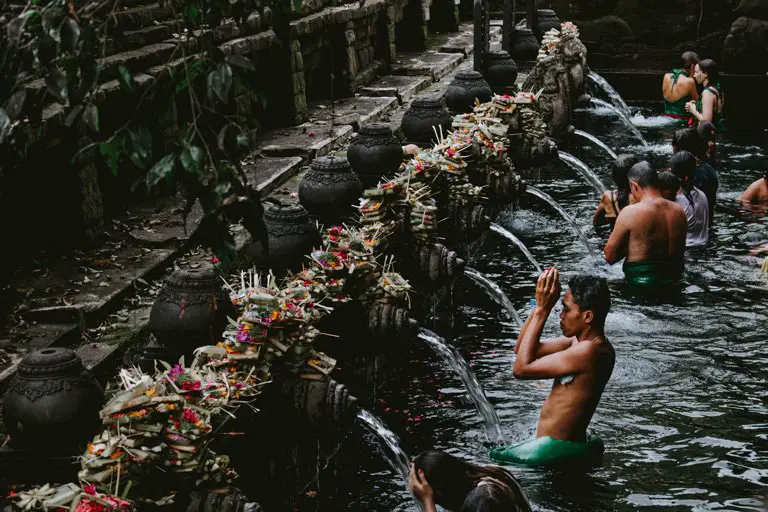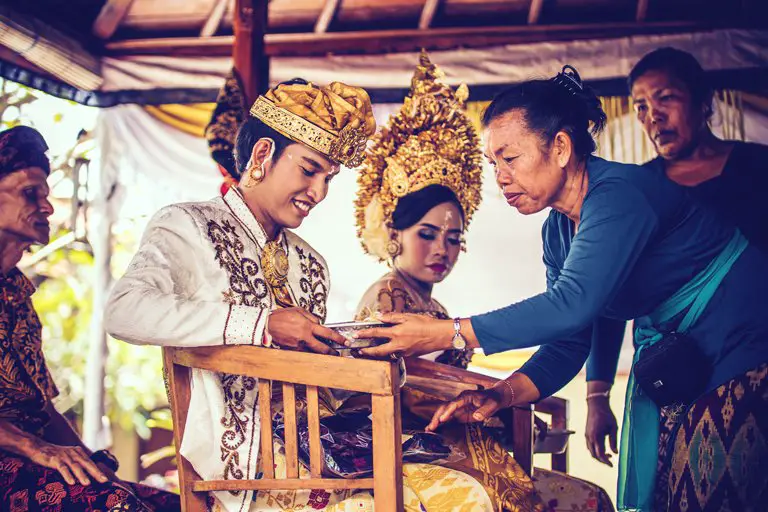BALINESE PEOPLE
The balinese are very happy people, helpful and very devoted to their religion and traditions. The inhabitants of Bali are charming people who will always try to engage in conversation with tourists and help them with anything they can. The balinese take it very easy and do not stress about anything, they are always smiling, happy and relaxed, which gives them high living standards. Religion and traditionas are very important in the life of the balinese and family life takes up a significant place.
RELIGION
The balinese, unlike the vast majority of indonesians, are not muslims but hindus. Balinese hinduism is a religion unique in the world and combines indian hinduism with pre-hindu mythologies of the island. The religious practices of the balinese aim to maintain a balance between the good and the evil and for this reason, they make offerings to both good and bad gods.

BALINESE SOCIETY AND THE CASTE SYSTEM
The balinese society is organised by a caste system by the names of the Brahmins, the Kshatriyas, the Vaishyas and the Shudras. These are the four castes in Bali and their names are reflected even in the last name of people who belong to them. Every balinese knows which caste he belongs to and goes to pray in the temples of his own rank.
The Brahmins
Brahmins are powerful and respected men who are destined to be priests. This caste is considered the superior one, but not all brahmins are rich. In fact, there are poor brahmins who are dedicated to the cultivation of the rice. Although men who belong to the caste of brahmins are destined to be priests, not all of them are. Priests can get married and can work on blessing people in temples, but no balinese from a different caste can be a priest. People belonging to the brahmin caste can be easily recognised by their name as it will always be preceded by Ida Bagus for men or Ida Ayu for women.
The Kshatriyas
It is said that the Kshatriyas are a caste descended from the nobles and kings of the Java court who fled from the muslim troops in the 15th century. The name of the men belonging to this caste is preceded by Anak Agung or Chocorde Gde and Chocorde Istri in the case of the women.
The Vaishyas
The Vaishyas are the merchant caste. Their names, for both men and women, are always preceded by Gusti.
The Shudras
The Shudra caste includes over 90% of the inhabitants of Bali, and usually, they are fishermen or farmers. In the last few years, due to the considerable growth of tourism, the Shudras have begun to work in the hotel industry, as drivers or tour guides. Shudras are also recognised by their names, and this is the same for women and men. The firstborn will be named Dewa or Wayan, which are the most common names in Bali. The second child to be born will be called Made, the third Nyoman, and the fourth Ketut. If a family has more than four children, the names will repeat. The fifth child is called Dewa or Wayan, the sixth Made, and so on.
Family Life
The balinese families live in a compounds called uma. This complex is formed by different buildings with rooms and warehouses where the whole family lives. Each family compound has a sanctuary called a sanggah.
In the past, marriage between people of different castes was forbidden and punishable by death. Now it is allowed, but if the woman is of a higher rank than her husband, she will lose the title and become part of her husband’s caste. If, on the contrary, the woman is of a lower rank, she will become part of her husband’s caste. Newly married couples live with the groom’s family until they can build their own homes, and at least one of the children of the family has to live with the parents to take care of them in their old age.

BALINESE COSTUMS
People in Bali are friendly and respectful with foreigners, and we must know, understand and respect their customs in order to not offend them. These are some of the basic rules that you have to pay attention to when travelling to Bali:
- Whenever you visit a temple, you must wear appropriate clothing. Temples cannot be entered with uncovered shoulders, nor with skirts or shorts. In most temples, it is mandatory to wear a sarong to cover your legs, and many times they even provide it if you don’t have one.
- Whenever you enter a balinese house, you need to take off your shoes and avoid showing the soles of your feet, as this can be considered disrespectful.
- Do not point your finger at anyone as it is considered offensive to the person you are pointing at.
- Do not touch anyone’s head, not even the children’s. The head is considered the most sacred part of the body, and the balinese believe that it is the door through which evil can enter. For this reason, men usually wear their heads covered with a headscarf and women wear their hair up.
- Don’t raise your voice. Balinese people like to be calm and avoid any kind of confrontation. If you have any problems or confusion, speak in a low tone, and you will see that it will be solved easier than if you raise your voice.
- The left hand is considered to be dirty as the balinese use it to clean themselves. For this reason, you always greet with your right hand. Greeting someone with your left hand is an offence.
- Whenever you want to photograph someone, ask for their permission. Balinese people care about you taking pictures of them. They will normally say yes, but like in any other country in the world, taking photos of a person without asking permission can be annoying.
Even though the balinese are very traditional people, you will see that they are very kind and friendly. You’re probably going to make a lot of friends on the Island of the Gods.


